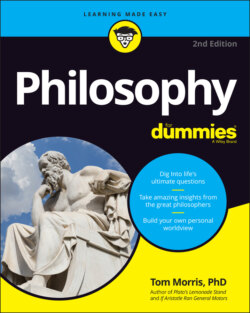Читать книгу Philosophy For Dummies - Tom Morris - Страница 64
When it’s good to doubt your doubts
ОглавлениеA British author, George Iles, once had the important insight that “Doubt is the beginning, not the end, of wisdom.” Skeptical inquiry can lead to a state of doubt. But perhaps that will bring considerable wisdom, for anyone who can handle the doubt properly. The skeptic has been relentless in asking: How do you know all that you think you know, or even any of it? How can you be rational in believing anything? Should you suspend belief about everything, or at least nearly everything? Sextus Empiricus suggested in his time that everyone should simply live in accordance with appearances, without ever concluding that appearances reliably indicate realities. You might wonder whether this is the reaction you should have to the skeptic’s questions and your amazing inability to answer them. But perhaps there is an alternative to take.
There is an interesting and powerfully rational option. Skepticism can teach you an important lesson, but it need not shut you down as a believer. Without believing that their own words have certain meanings rather than others, the ancient skeptics could not even formulate their own questions and challenges. And neither can you. Belief is necessary for everyone, and it’s also inevitable in human life. Perhaps, after all, it’s even supremely rational.
Suspending all beliefs as the classic skeptic suggests is literally impossible. And even if it weren’t impossible, it would be hugely impractical, and clearly dangerous. If there seems to be a truck bearing down on you as you cross the street, you’d better believe it and act accordingly. If skeptics suggest that you should just act on appearances while withholding actual assent, they are requiring a feat of mental gymnastics for which they have given you no compelling reason. But, you might worry, isn’t our inability to answer these skeptical questions itself compelling enough? No, the skeptic’s questions show only that the rationality of the most basic reasonable assumptions, and so the fundamental rationality of most ordinary beliefs, cannot consist, ultimately, in having good solid evidence independently available to show their truth. This is the main lesson of skepticism. Within the realm of rational belief, good evidence is normally crucial to demand and have, but it isn’t available for the deepest foundations of your beliefs, and so can’t be demanded or had there, and that’s both an important and fascinating truth to have discovered, thanks to the skeptic’s fascinating and monumentally irritating questions.
